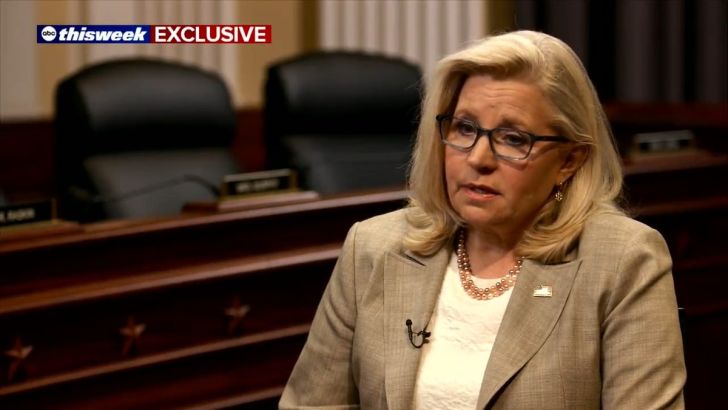I launched this newsletter four weeks ago. Thanks to all who subscribed. Most of the topics I wrote about remain in the news. That’s how news works now. Endless soap-opera. Here, in brief, are updates on those topics (working in reverse chronological order).
1. Latter-Day Liz
While the left continues debating the topic of whether or not Liz Cheney is good for democracy, and while MAGAworld dances giddily on her defeat in the Wyoming primary, Cheney herself is getting busy: She’s even expanded her target range. It’s not just Trump in her sights anymore.
In an interview with ABC’s Jonathan Karl, (airing Sunday, August 21st), Cheney called House Minority Leader Kevin McCarthy, “completely unfaithful to the Constitution, and demonstrated a total lack of understanding of the significance and the importance of the role of Speaker, so, I don’t believe he should be Speaker of the House.” Translate that into midterm voting advice, it means “I don’t believe the Republicans the Republicans should regain the majority.” She also lashed out against Josh Hawley and Ted Cruz, reinforcing the Democrats’s message that today’s GOP is too radical to trust with the majority in the House.

As I wrote previously, Democrats have a long list of reasons to oppose and reject Cheney and one huge reason to show her gratitude. Some on the left are clearly having trouble reconciling that. Some simply want to lionize her. Others to simply demonize her. Thinking complexly can be a strain. How can we reconcile and balance both impulses regarding Cheney? The best way that I’ve seen for navigating those conflicting attitudes is captured in a long, thread from historian Thomas Zimmer. Zimmer places Cheney squarely on the rightward part of the GOP spectrum favoring white Christian dominance—through her support of gerrymandering and her opposition to the Voting Rights Act. At the same time, Zimmer acknowledges that she refuses to cross the bright line that Trump and his minions have leapt over. “Good on her for refusing to cross over into open authoritarianism; but a defender of multiracial pluralism she is not.”

Last year, in an interview with John Stoehr, Zimmer warned,
There is nothing inevitable about progress. In fact, in US history, the price for any kind of substantial racial, cultural and social progress has always been political instability, because demands for racial equality and social justice are inherently destabilizing to a social order that’s always had white men at the top.
We are experiencing another one of those moments of instability – and it could absolutely lead to the forces of reaction triumphing. It has certainly happened before in American history.
It’s unlikely that Liz Cheney can dislodge her party from the iron grip of Donald J. Trump. But she doesn’t have to. Time inevitably will do that. He’s 76-years old. She’s 56. She’s playing the long game.
With a war chest of more than $14 million (raised, but barely spent) during her primary campaign, she clearly has the resources to make some noise. In the short run, everything she does will echo the Democrat’s campaign message that the GOP has fallen into the hands of radicals.
But let’s be clear that Liz Cheney’s long-term goals are not progressive. A GOP that reverts from Trump to Cheney is still firmly opposed to the principles of equality and social justice for all.
Stay woke.
2. Fixing the Climate Bill
Coverage of Biden’s recent winning streak is still lost in coverage of Trump’s legal jeopardy. (Last Tuesday, Peter Baker expanded that observation into an entire article in The New York Times: “Even on Biden’s Big Day, He’s Still in Trump’s Long Shadow,” sparking this takedown from James Fallows: “The people pointing the spotlight, have some responsibility for where the spotlight goes.”)
So, I found it startling, Saturday, to see the print edition of The New York Times not only pointed the spotlight at Biden and Climate (front page, top right position), but they even managed to keep Trump entirely off the front page. (Don’t worry. Sunday’s paper makes up for it.)
Why is Biden turning to executive action after scoring history’s greatest legislative victory on climate? A look back explains why.
The outlines of the Democrats’ climate policy came together during the 2020 primary campaign. Every candidate included a climate as a plank in their pitch—informed by climate activists and state policies. Those policy debates culminated in a the three-pronged approach: standards, incentives, and justice. The basics of that plan were hammered out in the month before the 2020 Democratic nominating convention by a Biden-Sanders Unity Task Force. The story was covered by, Dave Roberts in an article for Vox.com.
Unfortunately, the bill Biden signed last week contained only two of the three legs of the Climate policy— an array of incentives (investments, rebates, and tax credits) and a spending plan for climate justice. None of the Standards provisions made it in because of they can’t squeeze past the arcane budget reconciliation rules that allowed the Democrats to pass the bill with no Republican votes. Those rules say that only provisions that directly involve revenues and expenses can be passed through reconciliation.
It’s welcome news, therefore, that the administration has a work-around for delivering the standards component of the policy through executive action. Said the Times article:
Mr. Biden is on track to deploy a series of measures, including new regulations on emissions from vehicle tailpipes, power plants and oil and gas wells…. Gina McCarthy, the White House climate adviser, said that regulatory moves, combined with the new legislation and action from states, could help Mr. Biden meet his promise to cut greenhouse gas emissions by 50 percent, compared to 2005 levels, by the end of the decade.
The climate bill, she said, was “a starting point.”
(In choosing to bump this to their top story for Saturday, someone at The Times may just have been influenced by the Fallows criticism. — because an intention to issue executive orders isn’t exactly news. Yet. It’s just a White House spokesperson announcing that Biden is planning to make news. Stay tuned.)
3. Selling BBB (Biden’s Big Bill)

With the continued drop in the price of gas, and a streak of policy wins, the administration finally has a story to tell. Here’s how they’re planning to tell it.
Politico obtained and published an internal White House memo authored by Jen O’Malley Dillon (formerly Biden’s campaign manager, now Deputy Chief of Staff) and Anita Dunn (Senior Advisor to the President, with a long history in Democratic administrations and campaigns going back to Jimmy Carter)
From now until the end of August, Cabinet members will hit the road (more accurately, the skies) to 23 states on over 35 trips. They’ll be unleashing paid media, and outreach to stakeholders and allied groups.
Topline message:
“President and Congressional Democrats beat the special interests and delivered what was best for the American people. Every step of the way, Congressional Republicans sided with the special interests — pushing an extreme MAGA agenda that costs families.”
The memo states that messages about “lowering health care costs, prescription drug costs, and utility bills – are among the highest testing messages ever.”
Immediately after Labor Day Biden will hold a White House celebration—one day before Apple’s rumored fall product launch for iPhone and Apple Watch. Labor Day also happens to be the traditional kickoff of midterm campaigns. The timing couldn’t be better.
4. United States of America vs. Donald J. Trump
How naïve I was to imagine that Trump would fade away after his 2020 loss. He has dominated not only his party, but media coverage. Lately, however, that coverage has been running from bad to worse. To paraphrase a much-covered William Bell lyric, “If it wasn't for bad news, he wouldn't have no news at all.”
The metastasizing saga of the long arm of the law coming for Trump (and assorted henchpeople) dominates coverage in every media format. I noted the FBI search at Mar-a-Lago when it happened, but haven’t written about it since. I haven’t needed to. I’ll save it for the perp walk.
I will, however, talk about the political fallout of the case in my next update.




